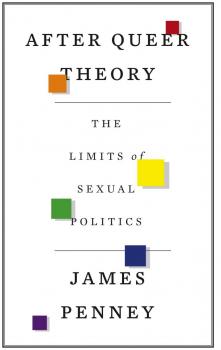 Queer theory is a way of thinking that undermines traditional ways of discussing sexuality and all that it entails. It can be an amazingly liberating tool which helps us to see the arbitrariness of typical gender roles, and it's possible that you've already come across two of its most famous proponents: Judith Butler and Eve Kosofsky Sedgwick. But is it also often an exercise in academic, bourgeois titillation?
Queer theory is a way of thinking that undermines traditional ways of discussing sexuality and all that it entails. It can be an amazingly liberating tool which helps us to see the arbitrariness of typical gender roles, and it's possible that you've already come across two of its most famous proponents: Judith Butler and Eve Kosofsky Sedgwick. But is it also often an exercise in academic, bourgeois titillation?
Penney denounces the, often over-refined, abstruse writing that, he believes, much of current queer theory consists of, yet the bulk of his book appears to suffer from this very problem.
The question is, how straightforward can the language of sexual politics be? Is it all, as Foucault wrote, 'an elaborate ruse designed to have us chatter endlessly about sex, all the while further tethering ourselves to the omnipotent forces of power'?
And has queer theory run its course as a practical discipline? Penney thinks this is almost the case, arguing that it is 'objectively bourgeois' since 'it's doubtful that one tends actually to worry much about [queer theory] if one isn’t sure where one's next meal is coming from'.
One chapter ('The Sameness of Sexual Difference') argues that each individual's sexual preferences radically differ from everyone else's. Penney wants to remind us that our idiosyncrasies should be kept in mind when linking sex with politics. As strange as this sounds, queerness - or any sexual identity - should not be used as a starting point for political action, because otherwise we risk spreading divisive, over-militant or 'identitarian' sentiments. Sexual differences are ubiquitous and so 'devoid of consequences for political thought'.
Penney examines many enlightening areas of sexual politics including perversion, sublimation, and family values. However, despite his noble intentions, Penney cannot resist the seductions of flowery academic language – raising the question of whether his powerful arguments can be articulated simply or not.
Like Penney, I am sick of coming across discourses that are 'elitist and cliquey, paradoxically normative', as well the more mainstream fallacy whereby 'being or identifying as homosexual doesn't in itself pose any necessary challenge to the ideological status quo'.
The introduction and final chapter of this book are fantastic sketches but fail to make a coherent whole.
And, while I wouldn't go as far as asserting that most of its contents are academic guff, I’m genuinely sorry to say that the electrifying claims made in his intro are not lived up to. A shame indeed.


